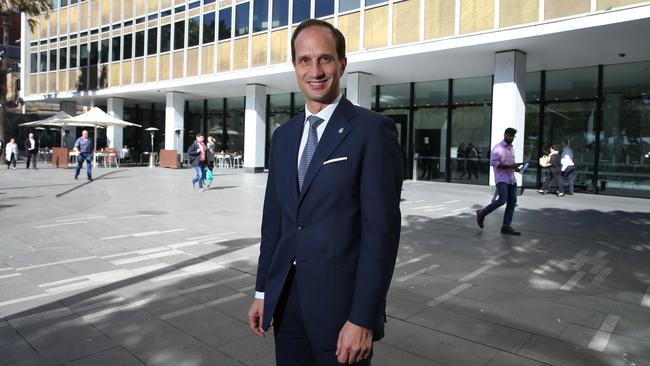AMP planners hit back
Financial advisers fear bankruptcy and losing their homes as anger grows over AMP’s restructure.

AMP’s financial advisers will argue the beleaguered wealth group failed to provide 13 months’ notice before sharply cutting purchase terms for planning practices, as they vow to fight a key plank of its new strategy.
AMP chief executive Francesco De Ferrari’s three-year restructuring plan for the group was unveiled on Thursday. It includes dramatically lowering the rate it will pay for financial planning practices as the “buyer of last resort” (BOLR), from four times recurring revenue to 2.5 times.
There are suggestions that and other changes will lead to AMP’s adviser numbers of 2400 being cut by about a third.
AMP also wants to raise productivity and is pushing further into automated and higher-end financial advice.
The move caused angst among advisers on Thursday when AMP’s Australian wealth management boss Alex Wade broke the news to the group.
The AMP Financial Planners Association (Ampfpa) says it will contest the changes because AMP did not meet contractual terms that require it to consult over changes and give members 13 months’ notice of any revision.
Mr De Ferrari argued the change was reflective of a reduction in market prices following a challenging time for the financial advice industry, which has seen grandfathered commissions scrapped and compliance requirements increase.
But Ampfpa disputed that point and said the AMP changes, in many cases due to the debt incurred by planners to buy practices, could lead some to lose their homes or face bankruptcy. AMP’s bank funded some of the advisers with a loan to buy their practice.
“Advisers had to pay four times recurring revenue to buy into the right to service an AMP client book. That was the price set by AMP. It was never a market value,” Ampfpa chief Neil Macdonald said.
“The adviser did not own the client book or any goodwill and would never have paid four times without AMP’s promise to pay four times when the adviser retired from the industry. Now, AMP is wanting to keep the four times entry price for itself and only pay back 2.5 times.”
The Hayne royal commission exposed a spate of questionable practices in the financial planning industry and has prompted tough industry reforms, including annual opt-ins by customers.
AMP was embroiled in a scandal that involved charging advice fees where services were not provided.
“AMP has already broken trust with its own customers and it has now broken trust with its own people,” Mr Macdonald said. “The reduction of the multiple applied under the BOLR terms is potentially disastrous to many advisers, particularly those who have given notice but have not yet been bought out.”
Mr De Ferrari was, however, steadfast on his plan when asked about the backlash by advisers. “The real driver here is that there is a market price for these types of assets, and the BOLR terms allow the possibility to adapt to changing circumstances, to market conditions,” he said.
But the move will have sweeping ramifications for AMP advisers who don’t fit the new model or are seeking to exit the industry.
“We are concerned about the potentially devastating flow-on effect of the financial loss,” Mr Macdonald said.
This week, Commonwealth Bank announced the closure of its Financial Wisdom planning arm after earlier agreeing to sell Count Financial.
Westpac has also exited the market after selling part of its planning arm to boutique Viridian and closing the remainder. ANZ sold its business to IOOF.



